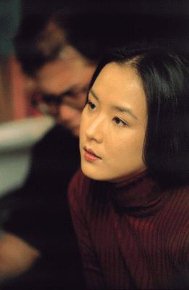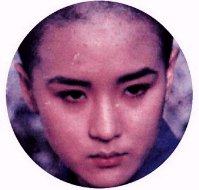Kang Su-youn: An Interview
by Adrien Gombeaud
A young woman enters the lobby carrying a couple of shopping bags. Just like many Korean tourists in Paris, she's been shopping on the Left Bank. She didn't have to wear sunglasses or sign one autograph -- "It's nice and quiet out there," she says. She starts to speak in a very natural way . Kang Su-youn is talented enough to be at the same time a star, a gifted actress and an average Korean young woman with shopping bags. Her retrospective in Paris shows three of her best films: "The Surrogate Woman" (Im Kwon-taek, 1986, for which she received a Best Actress prize in Venice) "Aje, Aje Para Aje" (also by Im Kwontaek, 1989) and "Road to the Racetrack" (Jang Sun-woo, 1991)
How did you became an actress?
I didn't choose to become an actress... I was chosen, really. I was spotted in the street at the age of four. The first words I said, I almost said them in front of a camera!
So you were already a famous actress when you did "The Surrogate Woman?"
Yes, but it's the first film that really traveled outside the country.
 That's also the performance you are the most known for abroad. What made you decide to play Ongnyo in that film? It's not an easy part...
That's also the performance you are the most known for abroad. What made you decide to play Ongnyo in that film? It's not an easy part...
That film occurs in a period of time that I haven't been through, of course . But families' preference for boys over girls is still a very deep-rooted and actual issue today - it's like a religion! So even though I was a young girl from the 20th century, I could very much relate to what the film was saying and to the character, because to me it was a contemporary issue . That's why I decided not to play it the way people usually portray characters from the past. With director Im Kwon-taek we tried to erase every stereotype of "historical dramas" and make it a modern film, while respecting the context. It was a very difficult shooting because the budget was very low, and I had a few difficult scenes to do, too.
Once I compared you to a ballerina in that movie...
Yes... well as an actress I think it's important to express your character not only through the dialogues, but also with the expression in your eyes and your whole body. It's true for every character I've played. For example, in "The Surrogate Woman " there is a scene where I'm locked in a very small room. Ongnyo is from the countryside and is not used to being locked in. There was no precise indication of what I had to do to express that feeling in the script. So I talked to Im Kwon-taek and I said, "I'm just going to run!" I stretched my limbs and ran around the room, and when I got tired he said, "Cut!"
It's a great scene! Did people notice the feminist aspect of that movie when it was released in Korea ?
Not really. The liberation of Korean women is not as advanced as in Europe or North America, and people only saw this movie as a traditional "costume drama." It's an aspect of the film that people noticed abroad in different festivals where the film was shown. That's why it is important for movies to travel...
At the time this film and some of your other films were made, there were a number of young directors making illegal movies on campuses, like the "Changsan Kotmae" collective. Were you aware of that?
Yes, I was aware of it. It was the time of the military regime, and movies were censored just like literature and the media. These young directors organized the resistance. Even though I was working in the mainstream industry, I knew their films and I supported them. Today's situation has been made possible thanks to their fight against the system. Some of them then became mainstream directors, and I worked with some of them, like Jang Sun-woo.
If you look at it from an exterior point of view, it may look like the story of a group of people who exploded into different individuals. It's not that simple. Of course, they have changed because the times have changed, but the way they work is still the same. Jang Sun-woo's "Lies," for instance, is manifest against the Korean system. It's still difficult to denounce lies in Korea . It would have been impossible to make this film in the 80's. I enjoyed working with Jang Sun-woo on "Road to the Racetrack," but I also continue working with people like Im Kwon-taek and in mainstream films. I don't think any one aspect of my work is more important than the other. I want to do both.
Have you ever become involved in a film for political or social reasons?
No. I hate politics, or at least I hate the word "politics." Of course when I choose to be in a movie, my choice always involves issues that are more or less political, it's beyond my control. But if you take a film like "Road to the Racetrack," for example, you can see it as a film on the social changes in the 80's, or as a comedy, or even as a mysterious thriller. People make films, but people who go see the film also make the film by the way they receive it. It's true not only in the movies I make but in my private life too: as I'm a public figure, I'm also responsible for the image that I give to people even when I'm not acting. It means that my image as a private person is part of my job as an actress.
In Korea many stars come and go. How can you last so long in the Korean film business as a star?
Korea is a small country, so the market is small too. Especially when you consider that 90% of the films we make are made for the teen audience. We don't produce that many films and our movies are not so diversified, so the roles an actor can get are sometimes limited, and people can get bored by an actor very quickly. In that context one can become famous in one day and disappear the next. I don't think people abroad realize how difficult it is to be a lasting star in Korea. I think we should make films for a more diverse audience and work on even more genres than we do. As far as I'm concerned, unfortunately I don't have any trick. All I can say is that I do my best in every movie I do. I try not only to be involved as an actress, but to work on the whole filmmaking process to help make the best film possible.
Korea more than any other country has often portrayed woman characters, and not always in a happy way. How do you explain that?
 That's because we love melodramas. Women have gone through so much pain in our history that they make good melodrama figures! On film, some people have even made the situation worse than it actually was. Also I must say that abroad, some aspects of this have been misunderstood sometimes.
That's because we love melodramas. Women have gone through so much pain in our history that they make good melodrama figures! On film, some people have even made the situation worse than it actually was. Also I must say that abroad, some aspects of this have been misunderstood sometimes.
In "Aje, Aje Para Aje," for example, my character is raped and then marries the man who raped her. Of course from a feminist point of view, it's kind of shocking, but it's a Buddhist film that you must view from a religious perspective. It's a film about the Buddhist concept of the "small vehicle." The character expresses self-sacrifice through the sacrifice of her own body: she sacrifices her body to save other people. In the film you also see monks that look very virtuous and clean. On the other hand, my character may look sordid, but through her life and the things she experiences, the people that she meets - in her own way she reaches a better understanding of Buddhism... and goes "higher and higher."
How have conditions for women changed since you started your career?
I think that people in Korea are still very conservative toward women, especially toward actresses because our life is known publicly . Today the younger generation is changing in terms of attitude and mentality. Still, it's very difficult to exist socially if you are not married . Even though I'm an actress, I also live in this society. I'm in the same situation as many young women who are working in Korea in this period of transition. And like all these women, I can change things by doing the best work I can.
PARIS October 1999